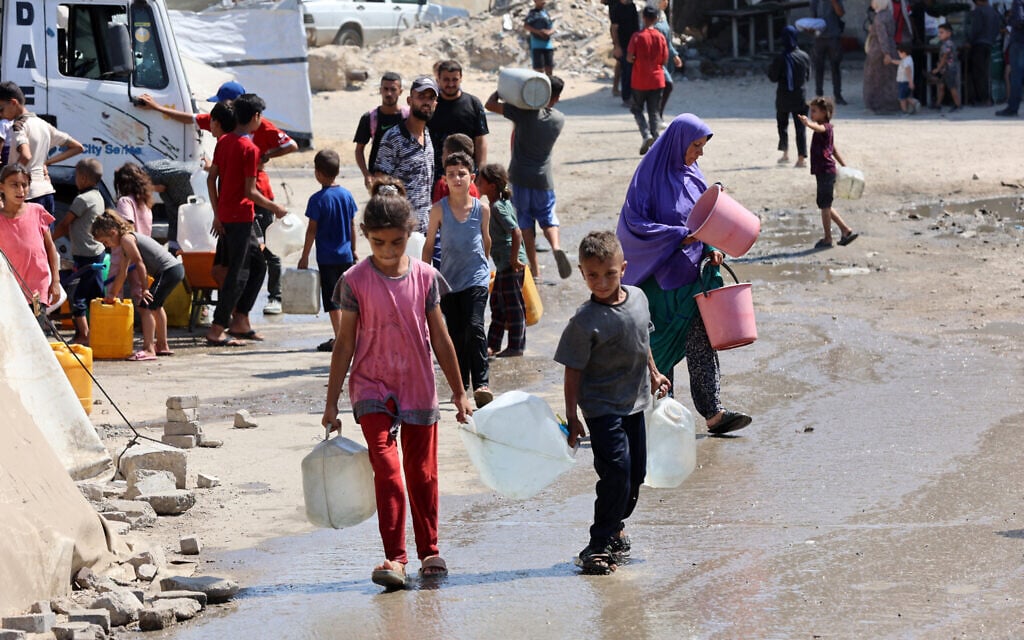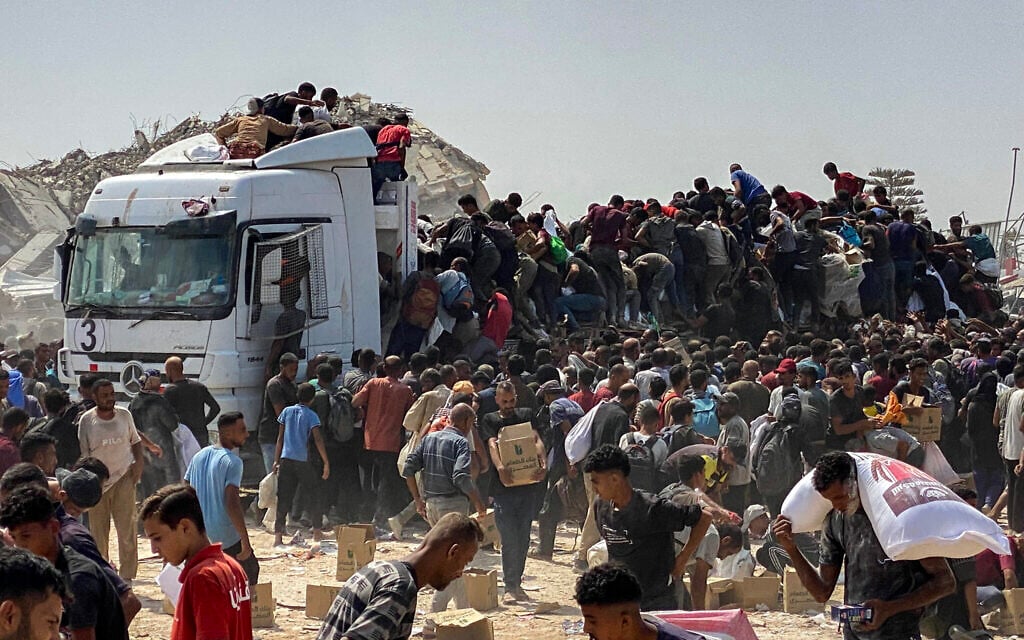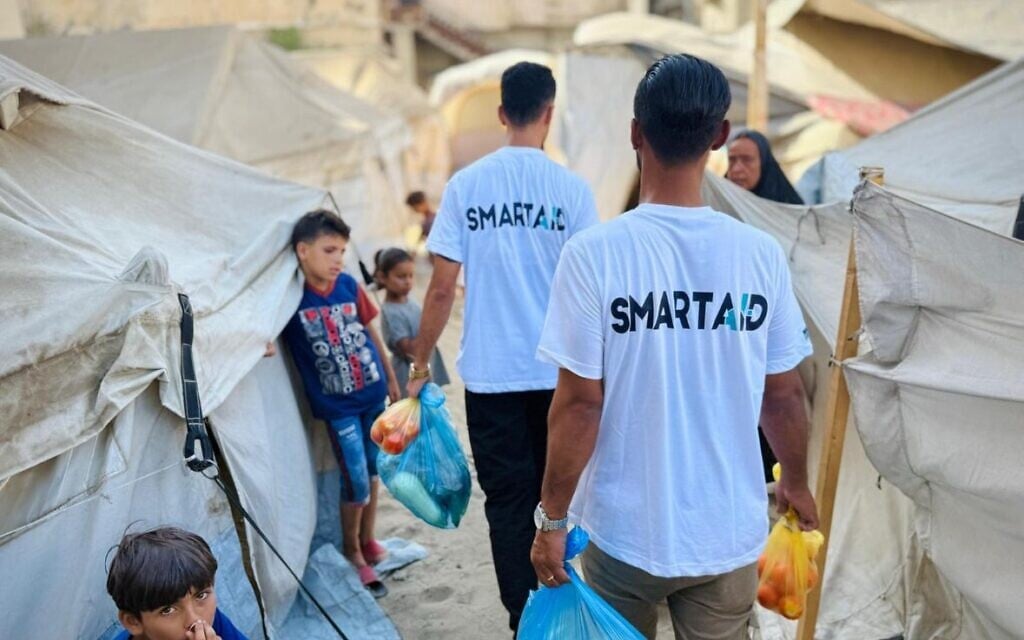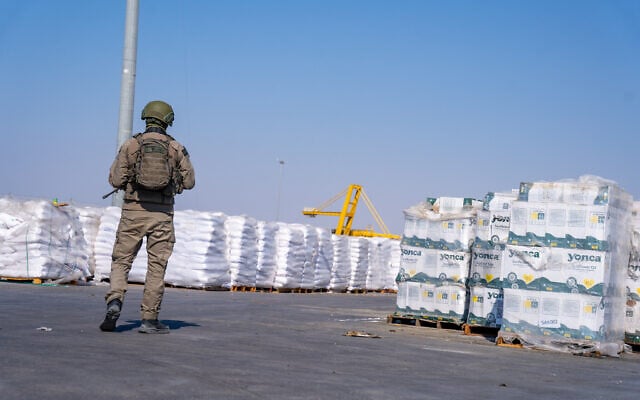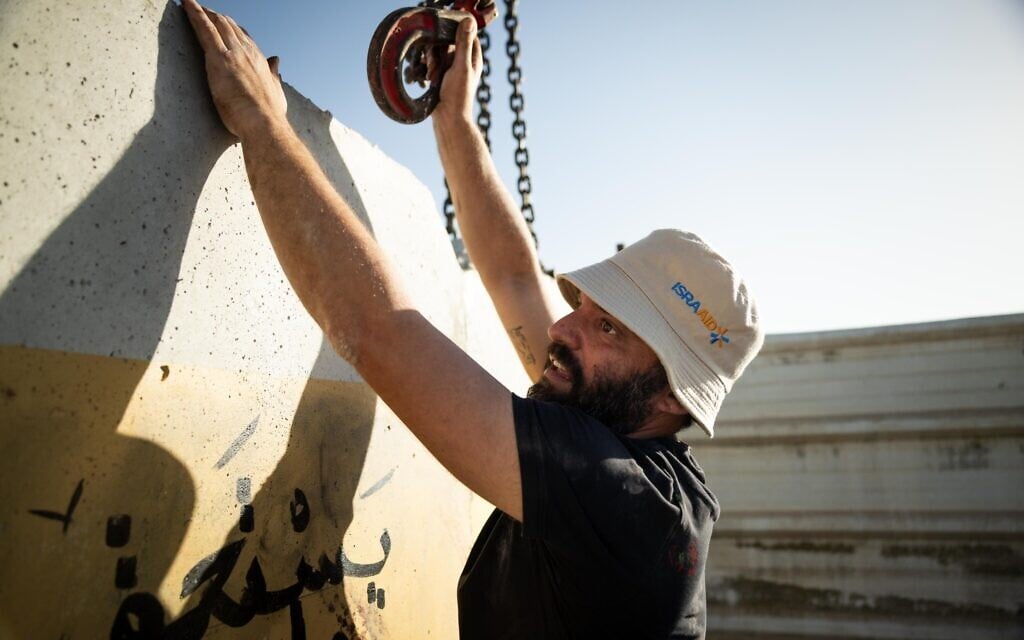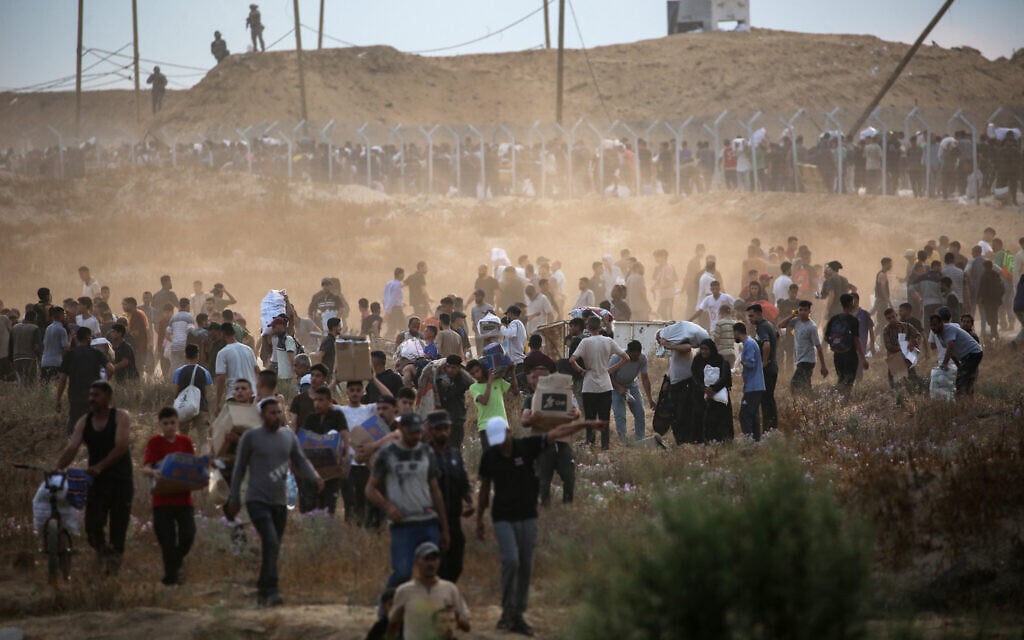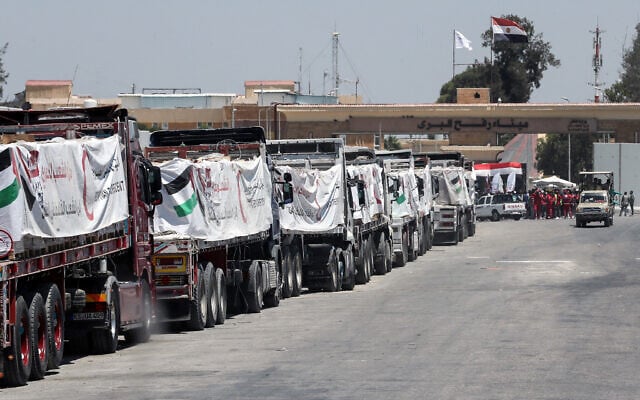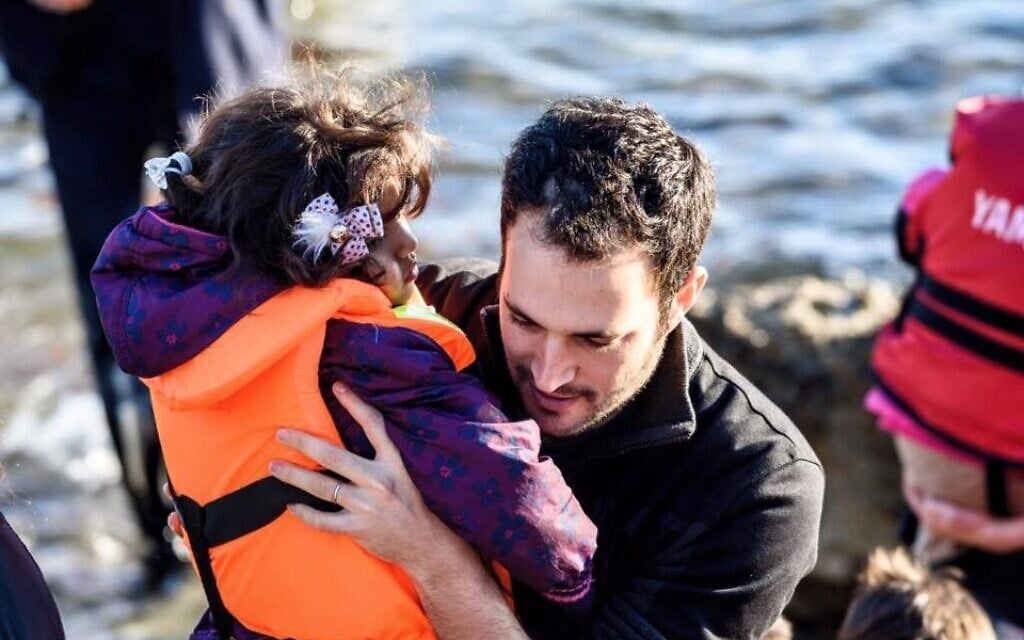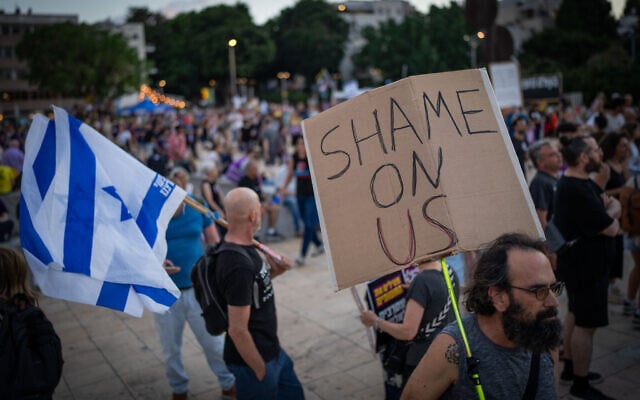


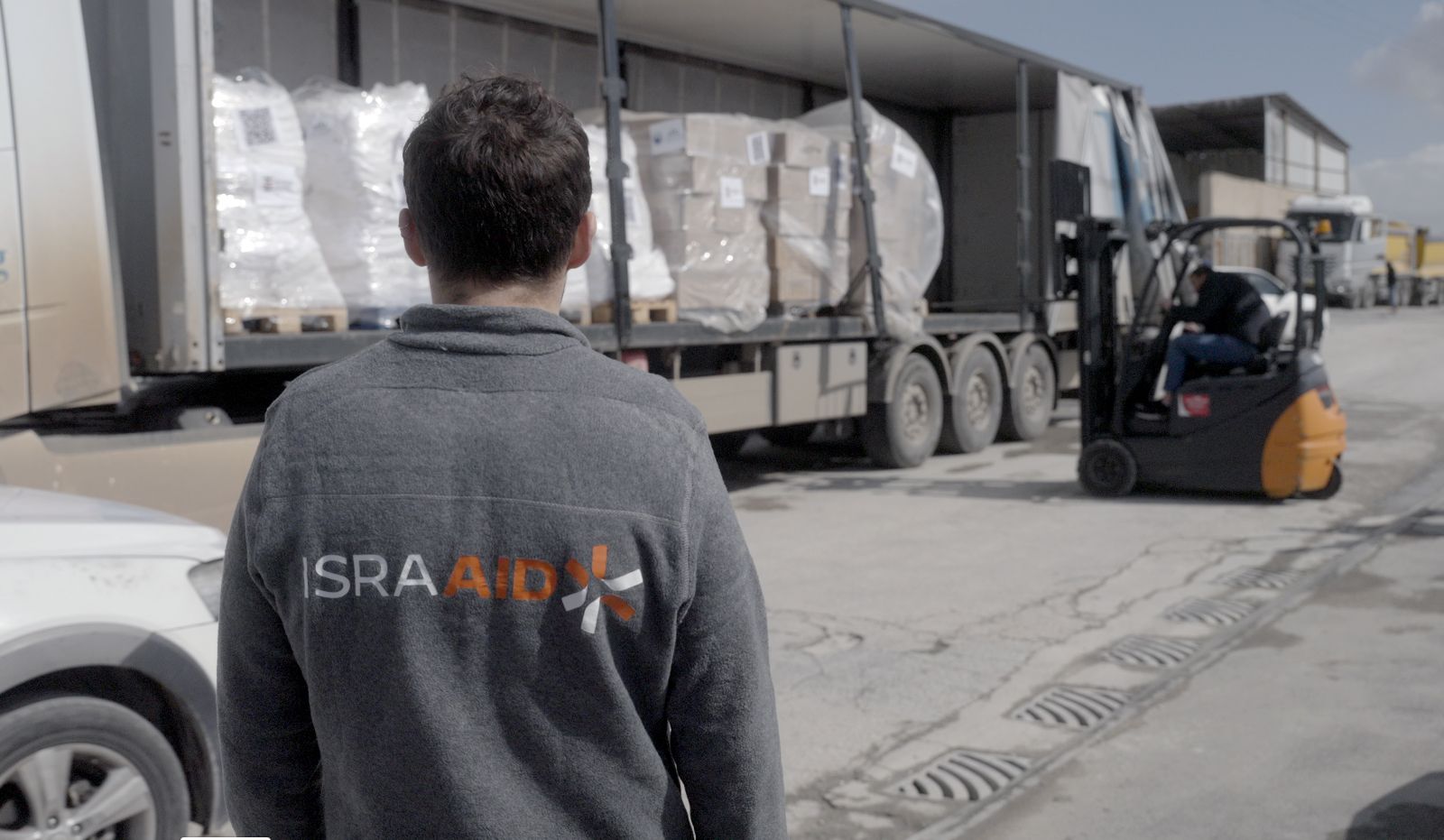
Of all the global disaster zones where IsraAID has provided frontline humanitarian assistance over the past two-and-a-half decades, its most challenging mission may be the one closest to home.
For the last year and a half, Israel’s largest nongovernmental aid organization has been quietly operating inside Gaza, navigating the tense space between the country it represents and the array of fellow humanitarian groups that accuse that country of authoring and even deliberately fueling the Strip’s worsening conditions. Another Israeli group, SmartAID, has also been operating in Gaza, alongside international rescue organizations.
In recent months, IsraAID has expanded the scope, even as accusations between Israel and humanitarian organizations, particularly the United Nations, have intensified.
Groups accuse Israel of restricting assistance, refusing to provide safe routes for aid to reach Gazans, and in some cases pursuing a genocidal policy of deliberate starvation and misery.
Meanwhile, COGAT, the Israeli Defense Ministry unit charged with coordinating Palestinian civilian affairs, has accused the UN and groups under its wing of failing to collect humanitarian aid permitted to enter Gaza and turning a blind eye to alleged systematic Hamas looting.
In recent days, IsraAID CEO Yotam Polizer has begun talking publicly about the group’s work in Gaza. Speaking to The Times of Israel, he maintained a careful diplomatic tone when describing the delicate campaign until the subject of blame came up.
“This war of accusations doesn’t help anyone, not the people in Gaza, not the people in Israel, not the border communities, and not the hostages,” he said.
Steering clear of any scintilla of politics or international diplomacy had been key to the group’s work, allowing it to keep its head down and focus solely on the humanitarian mission. “In some ways [it made] our work easier,” he said.
But conditions in the Strip have reached the point where Polizer can no longer keep quiet.
“The reason I’m going public with our work in Gaza is that the humanitarian situation there is extremely severe, and the only way to address it is to work together with Israel and allow organizations like ours — that understand both humanitarian and security needs — to take the lead,” he said.
Founded 24 years ago, IsraAID has worked in more than 60 countries around the world, dealing with war, earthquakes, hurricanes, and other crises. Until 2023, those missions were all far from home — from Ukraine to Uganda — focusing on medical aid, water and sanitation, psychosocial support, education and disaster preparedness.
Most of IsraAID’s 300-strong staff are not even Israeli, based on the belief that local teams know their communities’ needs best.
That outward-looking focus changed on October 7, 2023, when Hamas-led terrorists attacked Israel, killing over 1,200, taking 251 hostages, and displacing hundreds of thousands.
For the first time since its founding, IsraAID worked extensively within Israel, which became its main mission. It established a temporary elementary school for Kibbutz Be’eri, created resilience centers for evacuees, and eventually trained teams in 140 northern communities to support the return of displaced residents.
IsraAID initially avoided involvement inside Gaza, assuming that as an Israeli-based NGO, entry into the Strip — and acceptance by partners there — would be impossible.
However, in March 2024, the group was approached by international aid organizations it had worked with elsewhere who were operating in Gaza. These NGOs, which IsraAID does not name for security reasons, were struggling with Israeli bureaucracy, security restrictions, and even the language used by COGAT.
The group’s first role was thus as a facilitator, liaising between aid agencies and Israeli authorities to resolve problems, secure permits, and facilitate the delivery of supplies to field hospitals and medical teams.
A few months later, the organization expanded its involvement. With Israel allowing humanitarian goods for Gaza to be purchased from Israeli suppliers for the first time since the start of the war, IsraAID began supplying medicine, coordinating trucks, building warehouses and launching two large projects inside the Strip to provide healthcare and clean water.
“We bring in non-Israeli doctors from a neighboring country — I can’t say which — to perform life-saving surgeries in Gaza,” Polizer said. “We’ve brought in 30 doctors so far, with dozens more planned. We fund their travel and provide psychosocial support before and after their missions. On water, we collaborate with a partner organization in Gaza to provide daily drinking water to 7,000 people through desalination. We provide funding and technical expertise, guiding international and local Gaza teams via Zoom or phone.”
Due to security risks involved for groups in Gaza seen as collaborating with Israel, IsraAID does not disclose the names of its Gaza partners, display its logo, or publicize its involvement in specific projects.
IsraAID is not the only Israeli organization providing humanitarian assistance in Gaza during the ongoing war.
In January 2024, SmartAID — a non-profit run by IsraAID co-founder Shahar Zahavi — began operating in the Strip, providing food and setting up camps for displaced Palestinians.
Zahavi said he established SmartAID 8 years ago to focus on delivering humanitarian solutions through technology.
“I’ve been in the field of Israeli aid for 30 years, and the whole ‘Start-Up Nation’ concept hasn’t really matured in the humanitarian and technological spheres,” he said. “We in SmartAID focus on integrating technologies into disaster zones to help organizations, governments, and others identify which technology will best enhance the aid they already provide.”
That vision, however, cannot currently be applied in Gaza, where Israel allows only food, water, and basic humanitarian supplies in. Even so, SmartAID has been active in the Strip for the past year and eight months.
“In December 2024, international organizations approached us to ask if we planned to work in Gaza. We held discussions with government officials, the IDF, and leaders of Jewish communities abroad, and it came together — we began sending food shipments through Egypt and set up six displacement camps in Rafah.”
According to SmartAID, it has so far distributed 850 tons of humanitarian supplies, and more than 35,000 people live in the displacement camps it established.
Aid workers involved in SmartAID’s operations in Gaza wear shirts with the organization’s logo, thanks to the fact that most people do not know it is an Israeli group.
“We are currently helping with the distribution of hygiene products, food, and tents — because SmartAID is a humanitarian body, and we are humanitarians to our core. We work through organizations already active on the ground, assisting from the outside and coordinating from within,” Zahavi said.
He hopes SmartAID will eventually be able to focus on introducing technological solutions to many of the problems plaguing Gaza.
“Hopefully, in the coming months, it will become possible to bring in clean water and clean energy solutions so that Gaza will not have to depend on Israel,” he said.
After over a year of providing aid to Gaza, Zahavi does not believe there is a real clash between Israel and humanitarian organizations.
“There are nonstop conversations between the government and international actors, despite the media battles, because ultimately both have an interest in ensuring the civilian population doesn’t suffer,” he said. “The real challenge is once the aid crosses the border — getting it to specific points like kitchens. That’s where the friction happens today.”
With distrust rampant between COGAT and many humanitarian groups, Zahavi believes groups like his fill an important role.
“Israel’s stated interest is that the focus of the fighting is against Hamas, not the civilian population. From a humanitarian perspective, both Israel and the world want to help the Palestinian civilian population,” he said. “That’s why our focus is mainly on women, children, and people with disabilities. Both sides see us positively — Israel wants someone it can trust, and international organizations want the aid to get in.”
While it did not publicize its work widely, IsraAID was careful to inform Israeli border communities first about its work in Gaza.
“Before starting, we spoke one-on-one with every community. We received no negative responses — people greatly appreciated it. I think they understand this isn’t an attempt to do anything that harms the security of the State of Israel — on the contrary,” Polizer said.
He recalled a kibbutz community leader who told him that the group’s decision to work in Gaza had given her more hope than anything else since October 7.
“She understood that someone is thinking about the future and how it could be safer for everyone — including her own children in Israel,” Polizer offered.
In Gaza, the general public receiving IsraAID’s assistance does not necessarily know that an Israeli organization is behind the expertise, funding, and equipment. There is no IsraAID logo at the sites where they operate, and they do not publicize themselves inside Gaza. Still, IsraAID estimates that its work has reached 190,000 Gazans through the aid it has facilitated — tents, food, and water.
However, many Gazans who are part of the local teams of international aid organizations are aware, and some have even received remote training from Israel-based IsraAID technicians on operating clean water systems. According to Polizer, Gaza-based aid workers have not complained about working with Israelis.
“From what we hear from Gazans who work with them — and we’ve spoken to many — first of all, they are in a desperate situation and appreciate any assistance,” he said. “They also understand that the way to deliver aid to Gaza today is through Israel and with Israel’s approval, so they realize we [as an Israeli organization] have the ability to bring in more aid.”
Both IsraAID and SmartAID work within the UN-backed array of humanitarian groups, in contrast to the US-based and Israel-backed Gaza Humanitarian Foundation, which was set up in May as an alternative mechanism.
GHF has been criticized for only providing aid in areas under Israeli military control, which are cleared of any Gazan civilians, while all other groups, including IsraAID and SmartAID, operate in areas where Gaza’s civilians are living and have largely avoided working with it.
IsraAID and SmartAID have also not worked with GHF, though they do not rule out cooperation; both Zahavi and Polizer were careful not to single the organization out for criticism.
“I have criticism for everyone involved,” Polizer said when asked about Israeli policies in the Strip, which have been blamed for widespread hunger. “I know it sounds diplomatic, but criticism doesn’t help. What we need is to work together — with the government, COGAT, the army, the GHF, the UN, and NGOs — to get the job done.”
The IsraAID head said he believes that eventually the group will be able to establish a team of its own on the ground in Gaza, as it does in every other disaster zone where it has operated, but which has yet to happen in the Strip.
“Maybe I’m naïve, but I’m optimistic that at some point we’ll get there,” he said. “Maybe it will take 10 years, but we want to be able to work there with a team on the ground.”
Last week, the UJA-Federation of New York announced a million-dollar donation to support IsraAID’s operations in Gaza. According to JTA, the pledged amount exceeds any previously announced aid contributions to Gaza by Jewish groups.
Polizer, whose donors run the gamut from American corporations to Jewish philanthropic funds to the UN, said other Jewish communities abroad, particularly in the United States, had also been in contact with the organization regarding aid to Gaza.
“The issue of the Jewish communities is very important to me. We have long-term partnerships with federations and synagogues, and I’m in the United States every month,” he said.
The CEO sees IsraAID as a solution to what he calls the “complex situation” Jewish communities abroad face regarding Gaza. As accounts of dire conditions in the Strip have proliferated, many Jews in the United States and elsewhere have been moved to seek ways to ease Palestinians’ suffering while still maintaining support for Israel.
“I think the communities were very hesitant to get involved in the humanitarian aid issue in Gaza because it seemed extremely political to them, but here there’s an opportunity to do it with us,” Polizer said.
He called the move by the New York Federation a “very, very important step.”
“There’s a huge opportunity here for the international Jewish community, which today is suffering from antisemitism, fear, and real concerns about its Jewish values because of the humanitarian crisis in Gaza,” Polizer said. “They have an opportunity to work on this issue with us and to show that Israel and the Jewish community are not just part of the solution for aid to Gaza, but a leading part of the solution.”
In his view, Gaza is first and foremost a humanitarian issue.
“There’s no doubt that the issue of Gaza is more sensitive,” he admitted. “But above all, it’s a humanitarian issue, just like other places around the world where we feel we have the ability to make a significant impact and save lives.”

